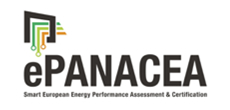 ePANACEA – Smart European Energy Performance Assessment and Certification
ePANACEA – Smart European Energy Performance Assessment and Certification
After 10 years of track record, the current EPC schemes across the EU face several challenges which have led to a not full accomplishment of their initial objectives: lack of accuracy, a gap between theoretical and real consumption patterns, absence of proper protocols for inclusion of smart and novel technologies, little convergence across Europe, lack of trust in the market and very little user awareness related to energy efficiency
The objective of the ePANACEA project is to develop a holistic methodology for energy performance assessment and certification of buildings that can overcome the above-mentioned challenges. The vision of ePANACEA is to become a relevant instrument in the European energy transition through the building sector.
ePANACEA comprises the creation of a prototype (the Smart Energy Performance Assessment Platform) making use of the most advanced techniques in dynamic and automated simulation modelling, big data analysis and machine learning, inverse modelling or the estimation of potential energy savings and economic viability check.
A relevant part of the project is to have a fluent dialogue with European policy makers, certification bodies, end-users and other stakeholders through two types of participatory actions: a feedback loop with policy makers, carried out through the so-called Regional Exploitation Boards (REBs) covering EU-27+UK+Norway on the one hand, and dialogue with end-users, established by means of specific thematic workshops, on the other.
Thanks to these participatory actions, the acceptance of the ePANACEA approach will be tested and validated in order to become aligned with and meet the needs of national public bodies, end-users and other stakeholders.
ePANACEA will demonstrate and validate reliability, accuracy, user-friendliness and costeffectiveness of its methodology through 15 case studies in 5 European countries.
Website: https://epanacea.eu
Twitter: @H2020ePANACEA
LinkedIn: H2020 ePANACEA project